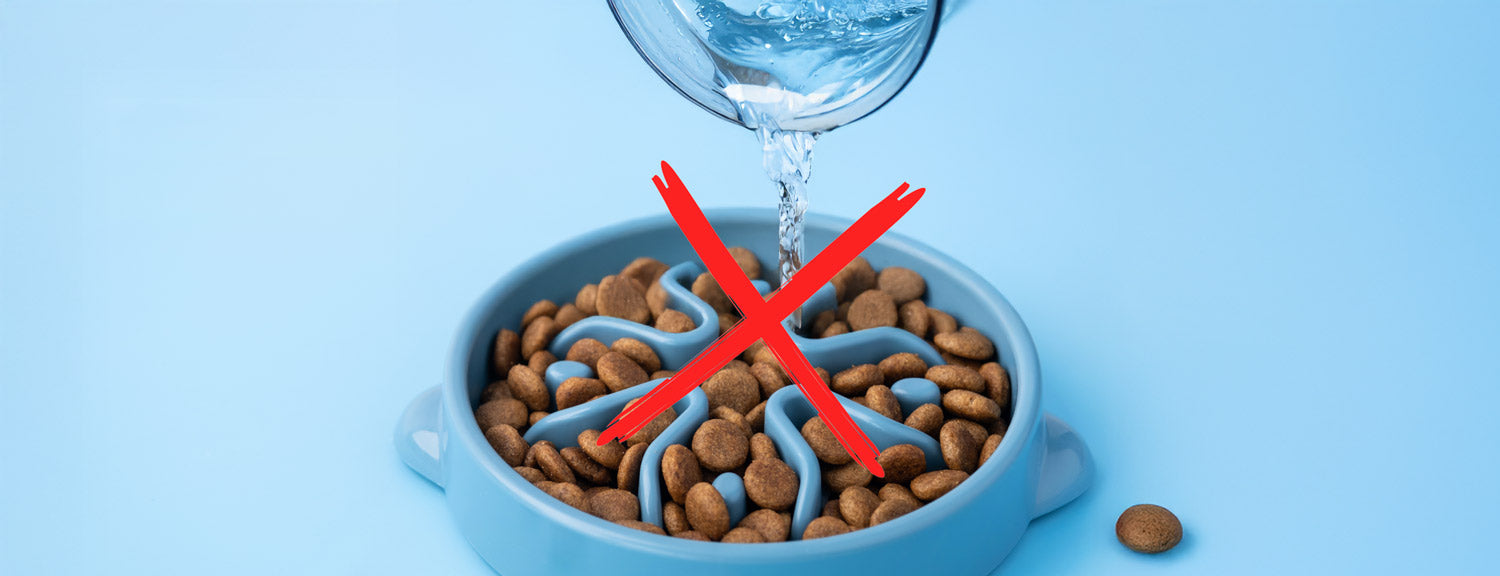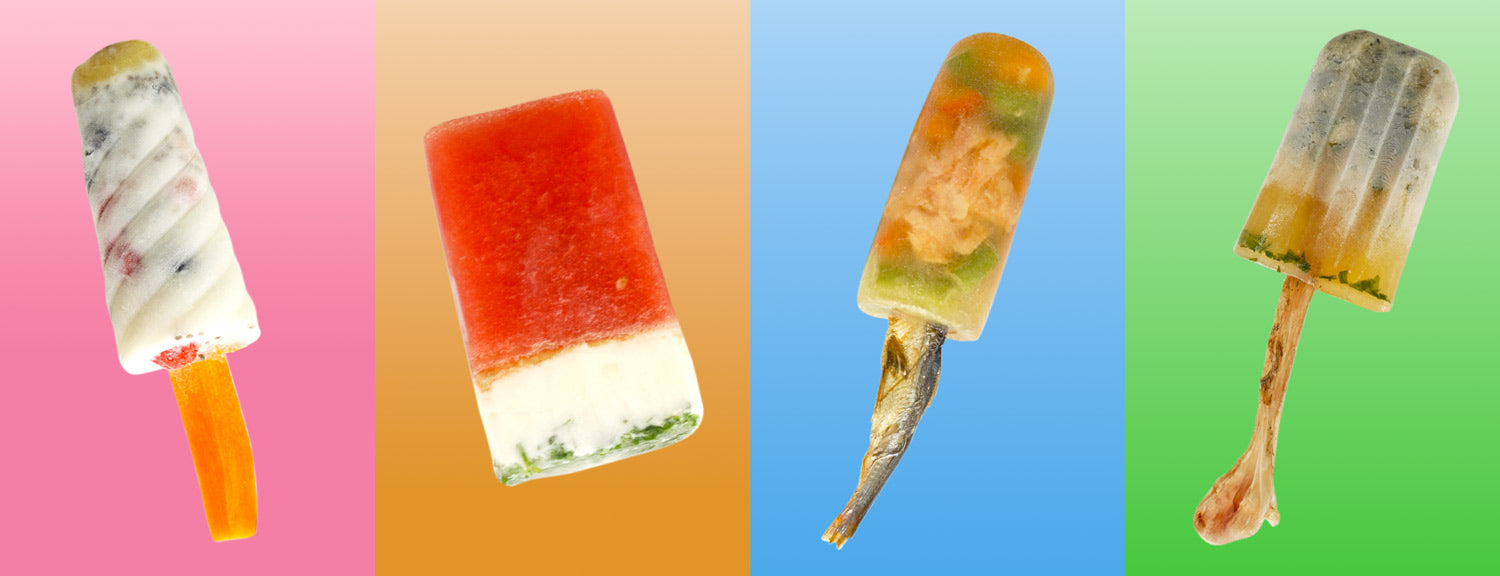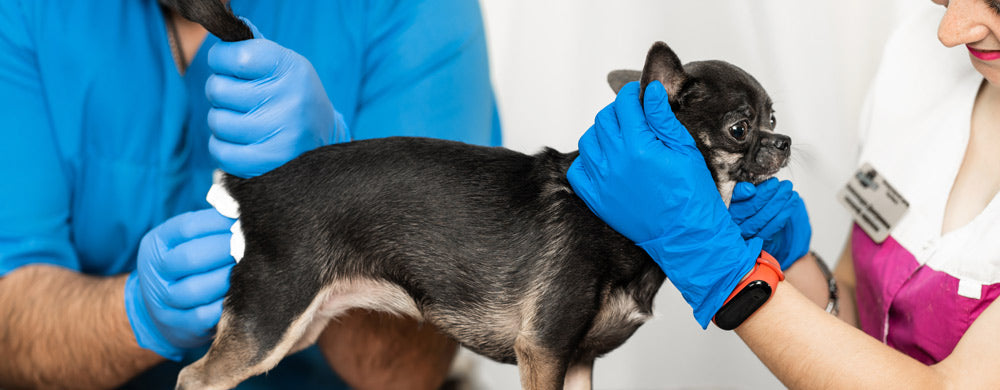Your basket is empty

Causes of Diarrhoea in Dogs and What to Do
March 16, 2022 7 min read
As a dog owner, your four-legged friend will inevitably be struck with a case of diarrhoea at some point in their life. Dogs are scavengers and will happily gulp down anything they can get their paws on, even more so if it’s yucky!
This often leads to loose stools and an upset tummy, but sometimes diarrhoea in dogs is due to something far more serious. If your dog is currently suffering from gut distress or you just want to be prepared for the future, here are some common causes of diarrhoea in dogs and what to do.
***
Symptoms of Diarrhoea in Dogs
The main sign of diarrhoea in dogs is watery, loose stools, which will be much softer than their normal faeces. Dogs suffering from diarrhoea will usually defecate more often than usual and in larger amounts. There may also be visible mucus in your dog’s stools.
The urge to defecate can come on suddenly, which can lead to faecal accidents in the home as your dog may be unable to get outside or let you know they need the toilet fast enough. Alternatively, some dogs with diarrhoea may strain or find it difficult to defecate, especially if they are sore around their bottom.
If your dog is suffering from a severe illness that has contributed to their diarrhoea, they may display symptoms such as:
- Fever
- Listlessness or lethargy
- Vomiting (especially if more than once)
- Reluctant to eat or eating less than normal
- Weakness
- Abdominal pain
- Blood in stools
- Excessive thirst or urination
- Seizures
***
Causes of Diarrhoea
There are many causes of diarrhoea in dogs, but the most common are simply eating rubbish or spoiled food. Dogs are experts at getting into things they aren’t supposed to, especially during walks.
However, if your dog is displaying other symptoms or is regularly suffering from diarrhoea, below are some other common causes of diarrhoea in dogs.
- Eating rubbish or gone-off food
- Change in diet
- Consumption of foreign objects like toys, fabric, and bones
- Eating too much food
- Food intolerance or allergy
- Illnesses like inflammatory bowel disease (IBD), colitis, cancer, liver and kidney disease, and irritable bowel syndrome (IBS)
- Ingestion of poisonous plants or substances
- Parasites like roundworms, whipworms, hookworms, giardia, and coccidia
- Anxiety or stress
- Antibiotics or other medications
- Infections with viruses such as distemper, parvovirus, and canine coronavirus (CCoV)
- Bacterial infections like salmonella
If your pooch only has a mild case of diarrhoea and isn’t displaying more serious signs like those mentioned earlier, chances are it’s because they picked up something when you weren’t looking.
***
When to Visit a Vet
If your dog is behaving normally and has had a single bout of diarrhoea, it’s not typically a cause for worry. Your dog most likely ate something that upset their tummy, which should pass within a day or so.
Monitor your four-legged friend closely and keep an eye on their bowel movements to see if they go back to normal. If your pooch is still unwell after 24 hours or has more than two episodes of diarrhoea, it’s best to get them checked out at a vet.

If you notice your dog straining to defecate but not passing any stool or small amounts of watery faeces, they may be suffering from an intestinal blockage from eating a foreign object like a bone or toy.
You should take your dog to see a vet as soon as possible as this is an extremely serious condition that can be fatal if left untreated. For instance, infections like parvovirus are very contagious and can be life-threatening. Speak to your vet immediately if your pooch has recurring or severe diarrhoea.
Additionally, if your pooch experiences diarrhoea on a regular basis, particularly in a short space of time, they may be suffering from a severe illness or health problem. This is especially true if your dog is elderly, young, or has a weakened immune system.
Symptoms like fever, bloody stools, vomiting, a painful abdomen, lethargy, and listlessness alongside diarrhoea should always be checked out by a veterinarian as they are often indicators of a more serious issue.
***
Preventing Diarrhoea
While some cases of diarrhoea are impossible to avoid, there are some things you can do to limit the chances of your dog becoming unwell.
- Give your dog a nutritious, well-balanced diet that’s free of unhealthy ingredients and fillers.
- If you suspect your dog has a food intolerance or sensitivity, figure out what it is through the process of elimination. That way, you’ll be able to limit your dog’s exposure to the food or ingredient.
- Don’t change your dog’s food suddenly. If you want to adjust your pooch’s diet, do so gradually by mixing in their old food with some of their new food for at least one week.
- Keep on top of your dog’s vaccinations, flea, and worm treatments.
- Exercise your dog regularly to keep them healthy and in good shape.
- Supervise your dog while they are outside or on a walk to make sure they don’t consume any rubbish, spoiled food, animal faeces, or other harmful substances.
- Keep house plants out of reach from your dog and make sure your garden doesn’t contain any poisonous plants.
- Don’t feed your dog table scraps and make sure spoiled food and rubbish are out of your pooch’s reach.
- Keep stressors in your dog’s environment to a minimum.
- Don’t let your dog drink from puddles or stagnant water such as a pond or lake.
Use probiotics and prebiotics such as TUMMY to keep your dog’s digestive system in tip-top shape.
***
How to Treat Diarrhoea
The majority of diarrhoea cases can be treated at home and will disappear within a couple of days. Provided your dog is behaving normally and isn’t exhibiting signs like recurrent vomiting, fever, seizures, bloody faeces, etc, then veterinary treatment isn’t usually necessary.
There are a few things you can do to treat diarrhoea and help your pooch on the road to recovery, which we’ll be going over below. Your companion should be back to their playful, happy self in no time!
24-hour Fast
Limiting your dog’s exposure to food for 24 hours can help flush out the cause of the tummy upset and give your dog’s gastrointestinal tract to recover. However, before you withhold food from your dog, make sure they are healthy enough to go through the fast.
For instance, senior dogs, puppies, small dogs, or canines with an existing health problem may not be physically strong enough to endure going without food for more than a day.
Lots of Water
Dogs need plenty of water when they have diarrhoea to regain the fluids they’ve lost in their faeces. Make sure your pooch has constant access to water to prevent them from becoming dehydrated.
Small, Bland Meals
Once your dog has completed their fast (if they are healthy enough to endure one), offer your dog small but regular bland meals to help their body get used to digesting food again. A good homemade diet for dogs suffering from diarrhoea is boiled plain white rice and chicken breast without the skin and bones or boiled sweet potato with white fish.
Alternatively, you can purchase food from your vet practice that’s targeted for dogs with an upset stomach. When your dog is beginning to pass solid stools, you can slowly mix in their normal food over a few days.
Avoid feeding your dog treats or rich/fatty foods until their diarrhoea has surpassed and they have fully recovered, otherwise their upset stomach is likely to return!
Rest
Diarrhoea can sap all your dog’s energy, so allow them to rest until they are back on the mend. Avoid vigorous activities and exercise - stick to gentle walks.
Probiotics and Prebiotics

Probiotics and prebiotics have a wealth of benefits for dogs, especially those with diarrhoea or with sensitive tummies. Probiotics are strains of bacteria that help colonize friendly bacteria naturally found in your dog’s gut.
Prebiotics are types of fibre that serve as a food source for good bacteria to promote growth. Both probiotics and prebiotics work to improve digestion, prevent disease, improve the immune system, enhance nutrient absorption, and treat or prevent diarrhoea and constipation.
Our supplement TUMMY is a great choice if you’re looking for a high-quality prebiotic and probiotic that will maintain your pooch’s digestive system and support the general wellbeing of their gut.
It contains a five strain probiotic blend of bacteria, as well as digestive enzymes and prebiotics to promote healthy gut flora. And as we know supplements can taste a little icky, TUMMY comes in a delicious chicken flavour that your pooch will have no trouble devouring!
Antidiarrheals
Dog-safe antidiarrheals can help control and stop diarrhoea in dogs as they decrease the number of fluids and electrolytes that go into your dog’s body and slow down the movement of your pet’s bowel, which reduces the frequency of their bowel movements.

This lets more fluid be absorbed into your dog’s body and allows for firmer stools. Antidiarrheals can be a good idea if you need to travel with your dog while they are suffering from an upset tummy, but they should not be used long-term or for more than a couple of days.
If you’re looking for a good antidiarrheal that’s completely safe for canines, look no further than GUTSY, our natural tummy suspension for dogs. It effectively manages diarrhoea and other stomach upsets, while also soothing your companion’s gut.
GUTSY is fast-acting and will firm up your dog’s stools quickly - in most cases, you’ll see results after just one dose! The main natural ingredients are Montmorillonite and Attapulgite clays, both of which work to eradicate toxins and protozoans from your dog’s body to help their digestive tract get back on the mend.
***
What Is Attapulgite and How Does It Work?
Activated attapulgite is a magnesium-aluminium phyllosilicate. This is a naturally occurring mineral that is obtained from a type of clay soil that is common to the South-eastern United States.
It is popularly used in antidiarrheal medications as it physically binds to acids and toxic acids in the tummy and digestive tract.
***
Final Thoughts
Although most cases of diarrhoea in dogs will pass within a day or so, it’s important to monitor your pooch closely and keep an eye out for symptoms like listlessness, bloody stools, recurrent vomiting, fever, seizures, and abdominal pain as these can be signs of far more serious health issue.
You know your dog better than anyone, so if you’re worried, don’t hesitate to get your four-legged companion seen by a vet. You can treat mild cases of diarrhoea at home by feeding your dog bland meals of boiled skinless and boneless chicken breast and plain white rice for a couple of days.
Offer your dog plenty of water and allow them to rest as much as possible to help them recover. Probiotics and prebiotics, alongside a dog-safe antidiarrheal, are ideal products to have on hand to settle your dog’s stomach and digestive tract quickly.
Also in Pet Advice

Should You Add Water to Your Dog’s Kibble? Here’s What the Science Says
August 14, 2025 7 min read
Should you add water to your dog’s kibble? Discover the science-backed pros, cons, and better alternatives like bone broth and fresh food to improve hydration, digestion, and overall canine health...

DIY Frozen Dog Treats Your Pup Will Love
June 27, 2025 4 min read
Summer heat can be dangerous for dogs, making hydration more important than ever. Learn how to spot signs of dehydration, boost your pup’s water intake, and create fun, frozen recipes to keep them happy and healthy all season long.

Why Is My Dog Scooting? Common Causes and How Diet Can Help
May 09, 2025 4 min read
If your dog is scooting or smells fishy, it could be due to blocked or irritated anal glands. Learn what causes blocked anal glands, which dogs are most at risk, and how simple dietary changes—like adding fibre and anti-inflammatory nutrients—can help prevent recurring problems.
